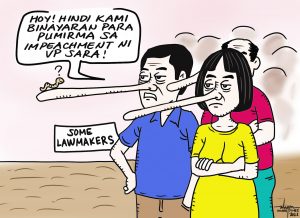When the President announced that he would no longer seek an extension of the declaration of martial law in Mindanao, it ended at the stroke of midnight on December 31, 2019.
According to the news, however, the military has insisted that Mindanao is still under a “State of Emergency” as declared by the President under Proclamation 55 which was issued on September 4, 2016 prior to the declaration of martial law in May of 2017.
What does this mean and what is the difference? Some people have asked me this question so I decided to try explain the issues.
In relation to these questions, it must be emphasized that the function of the Armed Forces of the Philippines (AFP) is supposed be the protection of our country from external threats, i.e., invasion or state sponsored espionage activities and the like, as well as internal threats from rebellion or insurgency in the country.
It does not normally include police functions which would be within the purview of the Philippine National Police, as well as other law enforcement agencies.
However, the Constitution provides, under Section 18 of Article VII, that the President has what is termed as the “calling out powers” which is to say that as its Commander-in-Chief, the President can “call out such armed forces to prevent or suppress lawless violence, invasion or rebellion whenever it becomes necessary”.
In other words, even if it is not related to any invasion or rebellion, when the scale of lawless violence has reached a stage that already makes it necessary, the President can call upon the AFP to take action to suppress or prevent it.
For example, even if it can be argued whether or not some Islamic extremist groups, like the Abu Sayyaf or ISIS, are technically rebels, the AFP can still go after them when the President deems it necessary and even if such functions may already overlap with what are traditionally police functions.
So, what is a declaration of a state of emergency? It is basically just a declaration recognizing the existence of such an emergency, a recognition of a state of facts. In the case of Declaration No. 55, the emergency was the escalation of lawless violence.
The fact is that with, or without, such a declaration, the President can exercise his calling out powers. It does not add, or detract, from the powers granted to him by the Constitution.
In the case of Declaration No. 55, President Duterte just made it clear that the reason for his exercise of the calling out powers was the escalation of lawless violence including, as cited therein “abductions, hostage-takings and murder of innocent civilians, bombing of power transmission facilities, highway robberies and extortions, attacks on military outposts, assassinations of media people and mass jailbreaks” as well as cited instances of the bombing in Davao City and ambush of government troops by the Abu Sayyaf.
A declaration of martial law, on the other hand, which empowers the military to take over control and exercise authority in areas where the civilian authorities are partially, or fully, no longer functional, is subject to several restrictions.
Congress can revoke it or extend it as its members see fit and the Supreme Court can even review the factual basis for its declaration and can declare it to be illegal.
The same is true for a suspension of the privilege of the writ of habeas corpus which, in essence, means that courts cannot compel the military, or law enforcement agencies to legally justify the arrest or detention of persons. I would like to be clear, however, that the suspension of the said privilege of the writ is not a defense against the criminal liability of soldiers or policemen for illegal arrest or detention, if this should later prove to be true.
So, to answer the questions of a paranoid few, let me break it down to the following:
1. Neither a declaration or any state of emergency nor a declaration of martial law will result to the loss of any of your rights under the Constitution. It will be noticed and emphasized the even the now ended martial law in Mindanao did not result to any substantial take over of civilian functions by the military except maybe for a short time in war-torn Marawi and nearby areas;
2. If there is any suspension of the privilege of the writ of habeas corpus, first, it should apply only to persons charged for rebellion or in relation to an invasion and, more importantly, it does not mean that soldiers and policemen can get away scot-free if they even detain anybody without any lawful basis. They will still be criminally liable only that it may take a little longer. To be sure, the Constitution also says that anyone arrested must be charged within three (3) days otherwise he should be released; and
3. People should know and realize that neither a declaration of a state of emergency nor even a declaration of martial law gives the military, the police, or anyone else any right to ignore civilian rights or commit acts of abuse or oppression. Ay soldier or policeman who says, or does, otherwise should be taken to task.
In ending, I cannot underemphasize the great need for people to know their rights under the law not only in relation to the foregoing matters but in everyday life as well. There have been too many instances of victims of abuses becoming so only because they mistakenly thought that what was being done to them was under the auspices of legal authority.
Know your rights so that it will be that much harder to deny or ignore them.

